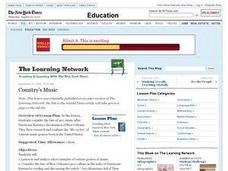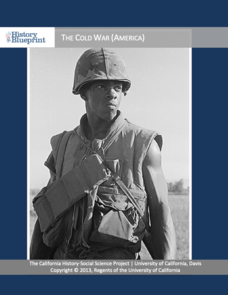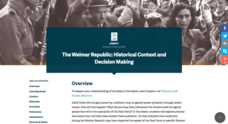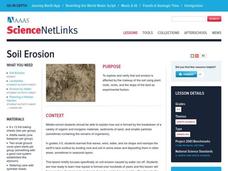University of California
Roots of the Cold War
When and how did the Cold War begin? To answer this question, you will not find a better-organized, in-depth, activity- and inquiry-based resource than this! Executing best teaching practices throughout, each portion of this inquiry...
Curated OER
Once Upon a Word
Students explore the derivations and usage of common slang terms. Through internet research and discussion, students consider the Latin and Greek roots of contemporary slang terms. Groups complete an etymology chart documenting their...
Curated OER
Vocabulary Building
Use primary text documents to learn word roots. Learners listen to a reading of the Declaration of Independence and highlight words they don't know. They compile these words and guess their meanings. They discuss roots, prefixes,...
Curated OER
Alexander Hamilton and the Roots of Federalism
Explore the origin of political parties in the United States. Learners work in groups to read and analyze copies of the "Report on Manufactures" written by Alexander Hamilton. Then, they complete a worksheet comparing the Federalists to...
EngageNY
Mid-Unit 1 Assessment: Human Rights Vocabulary and Common Prefixes
Here is a mid-unit assessment for a group of lessons studying the Universal Declaration of Human Rights (UDHR). The first half of this instructional activity calls for several forms of review. Your class will review the content of the...
Core Knowledge Foundation
Unit 6: American Revolution
The American Revolution is the theme of a five-week unit that focuses on reading, grammar, morphology, and writing. Scholars read and respond to texts, practice spelling and word work, and write paragraphs. Assessments gauge comprehension.
Curated OER
The Roots of American Culture
Students explore the notion of culture and the influence of Latino culture on the U.S. They work in small groups to identify ways that Latino and non-Latino U.S. cultures have engaged in cultural 'cross-fertilization.'
Curated OER
Loose Lips
Have your middle and high schoolers analyze instances of celebrities using racial slurs or making prejudiced comments in public. After reading an article, they consider the roots and effects of prejudice and bias. As a class, they...
Curated OER
Country's Music
Jazz, Blue Grass, Hip Hop, Swing. Gospel, R&B, Ragtime, Disco. So many music genres born in the USA. After reading an article about the fate of New Orlean's Jazz after Hurricane Katrina, class members investigate the life cycles of...
EngageNY
Summarizing Complex Ideas: Comparing the Original UDHR and the "Plain Language" Version
The eighth lesson plan in this series continues the focus on vocabulary and increasing young readers' awareness of academic language. Pairs of learners participate in a short vocabulary review activity called Interactive Words in which...
Federal Reserve Bank
The Great Inflation: A Historical Overview and Lessons Learned
Your young economists will explore the roots of fears about high inflation by learning the effects of rising prices during the world wars and in particular the Great Inflation of the 1970s.
University of California
The Cold War (America)
The Cold War—with its roots in World War II—impacts the world today. Using an extensive curriculum, scholars consider its impact through primary sources, including speeches and propaganda, as well as other skills-enhancing activities. An...
EngageNY
Close Reading: The Introduction to the Universal Declaration of Human Rights
As part of a group of lessons, your class will return to the primary text for this unit, the Universal Declaration of Human Rights. Key vocabulary as well as close reading strategies continue to be the focus skills; however, this lesson...
iCivics
Step 4: Consider the Context
Have you ever noticed how deep the roots of a tree or plant stretch? Scholars analyze the context of an issue and the root causes that go to the base of the problem. The fourth step of a 10-part County Solutions - High School unit shares...
Facing History and Ourselves
Us and Them: Confronting Labels and Lies
Stereotyping and discrimination based on religion catalyze many atrocities in the world. Explain the awful treatment of Jews and the lies Nazis spread by using an informative yet sensitive resource. Learners participate in a warm-up and...
University of the Desert
What Are the Possible Causes of Cultural Misunderstanding?
Why do cultural misunderstandings happen? What causes stereotypes, and what is dangerous about them? After viewing some possible explanations to these questions provided by young adults around the world, your learners will discuss how...
Curated OER
Soil Erosion
Students examine how erosion is affected by the composition of the soil and the slope of the land. They look at plant roots, rocks and land slope as experimental factors. They complete the associated worksheets before discussing their...
Curated OER
Defense Mechanisms
Learners examine the Cold War roots of the recent debate over the construction of United States and Russian missile defense shields. They begin by reading and discussing the article, Putin Says Russia Would Counter U.S. Shield.
Curated OER
Understanding Presidential History
Students research to find the qualifications necessary to be President of the U.S. For this presidential qualification lesson, students research their family roots to see if they could qualify to be President. Students create a graph to...
Curated OER
Stirring the Melting Pot
Students consider the interrelationships among race, ethnicity and culture. After reading the article, Young Japanese-Americans Honor Ethnic Roots, they examine ways in which they identify with and celebrate their own ethnicities.
Curated OER
Famous People and Cultural Diffusion
Students use the internet to identify cultural traditions throughout the world. In groups, they examine each culture and determine the effect they had on life in the United States. They use this information to write a family history...
Curated OER
Coalition or Division?
Students research and write essays on contemporary Italian politics and their roots to explain the prime minister's recent resignation in context. They explain why coalition governments are formed.
Curated OER
Our Ethnic Ties-A Nebraska Calendar of Cultural Events
Tenth graders investigate the historical and cultural ties that influence the ethnic character of communities and the local economics throughout the state of Nebraska. They collect data on cities and towns that hold ethnic festivals and...
Curated OER
Cognate Detectives
Second graders examine how some root words are the same in English and Spanish. They explore cognates in Spanish and English language.























